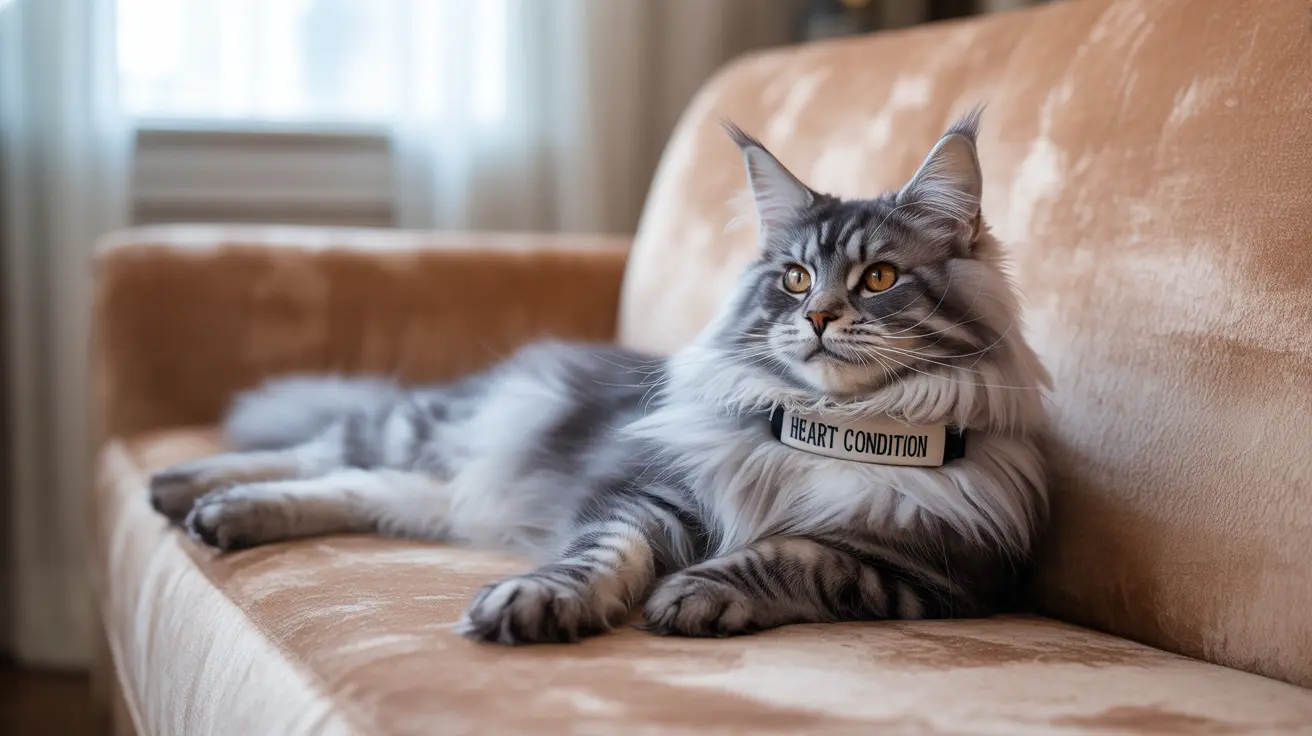What is an Enlarged Heart in Cats?
An enlarged heart in cats, medically known as hypertrophic cardiomyopathy (HCM), is the most common heart condition affecting our feline companions. This serious cardiac condition occurs when the heart muscle becomes abnormally thickened, particularly affecting the left ventricle. This thickening makes it harder for the heart to pump blood effectively throughout the body.
Statistics show that approximately 1 in 7 cats may develop an enlarged heart during their lifetime, making it a significant concern for cat owners and veterinarians alike. The condition can affect cats of any age, though it's most commonly diagnosed in middle-aged to older cats.
Symptoms and Early Detection
Identifying an enlarged heart in cats can be challenging because many cats show no obvious signs until the condition has advanced significantly. However, there are several key symptoms that cat owners should watch for:
- Difficulty breathing or rapid breathing
- Lethargy and weakness
- Reduced appetite
- Exercise intolerance
- Collapse or fainting episodes
- Paralysis in the hind limbs (due to blood clots)
Regular veterinary check-ups are crucial for early detection, as veterinarians can often detect heart murmurs or irregular heartbeats during routine examinations before visible symptoms appear.
Life Expectancy with an Enlarged Heart
The life expectancy of cats with an enlarged heart varies significantly depending on several factors:
- Severity of the condition at diagnosis
- Presence of complications
- Response to treatment
- Overall health of the cat
Cats diagnosed early without symptoms may live for many years, sometimes achieving a near-normal lifespan. However, once clinical signs develop, particularly congestive heart failure, the prognosis becomes more guarded. Recent studies indicate that cats with symptomatic HCM typically live between 6 months to 5 years after diagnosis, though some cats may survive longer with proper care.
Treatment Options and Management
While there's no cure for an enlarged heart in cats, various treatment options can help manage the condition and improve quality of life:
- Medications to control heart rate and reduce workload
- Diuretics for managing fluid buildup
- Blood thinners to prevent clot formation
- Regular monitoring and veterinary check-ups
- Dietary modifications as recommended by veterinarians
The success of treatment largely depends on early detection and consistent management of the condition. Working closely with a veterinary cardiologist can help develop the most effective treatment plan for your cat.
Improving Your Cat's Quality of Life
While life expectancy might be reduced, many cats with enlarged hearts can maintain a good quality of life with proper care. Consider these important steps:
- Maintain regular veterinary appointments
- Monitor breathing rates at home
- Provide a stress-free environment
- Follow medication schedules strictly
- Watch for changes in behavior or symptoms
- Make appropriate lifestyle modifications
Frequently Asked Questions
What is hypertrophic cardiomyopathy (enlarged heart) in cats and how does it affect their heart function?
Hypertrophic cardiomyopathy is a condition where the heart muscle becomes abnormally thickened, particularly in the left ventricle. This thickening makes it harder for the heart to relax properly and pump blood effectively, reducing overall heart function and potentially leading to complications like congestive heart failure.
How is hypertrophic cardiomyopathy diagnosed in cats, and what tests should I expect from my veterinarian?
Diagnosis typically involves several tests, including echocardiography (heart ultrasound), chest X-rays, blood tests, and electrocardiograms (ECG). The echocardiogram is the gold standard for diagnosis, as it allows veterinarians to measure heart wall thickness and assess overall cardiac function.
What symptoms indicate my cat might have an enlarged heart or HCM, and when should I seek immediate veterinary care?
Key symptoms include difficulty breathing, lethargy, reduced appetite, and exercise intolerance. Seek immediate veterinary care if you notice rapid breathing, open-mouth breathing, collapse, or sudden paralysis of the hind limbs, as these can indicate serious complications requiring emergency treatment.
How does hypertrophic cardiomyopathy impact the life expectancy of cats, and what factors influence their prognosis?
Life expectancy varies widely, from months to years, depending on factors such as disease severity, presence of complications, and response to treatment. Cats diagnosed early without symptoms generally have better prognoses than those diagnosed after developing complications like congestive heart failure or blood clots.
What treatment options are available for cats with hypertrophic cardiomyopathy to improve their quality of life and survival time?
Treatment options include medications to control heart rate and reduce cardiac workload, diuretics to manage fluid buildup, and blood thinners to prevent clots. Regular monitoring, dietary adjustments, and stress reduction are also important components of managing the condition and extending survival time.






